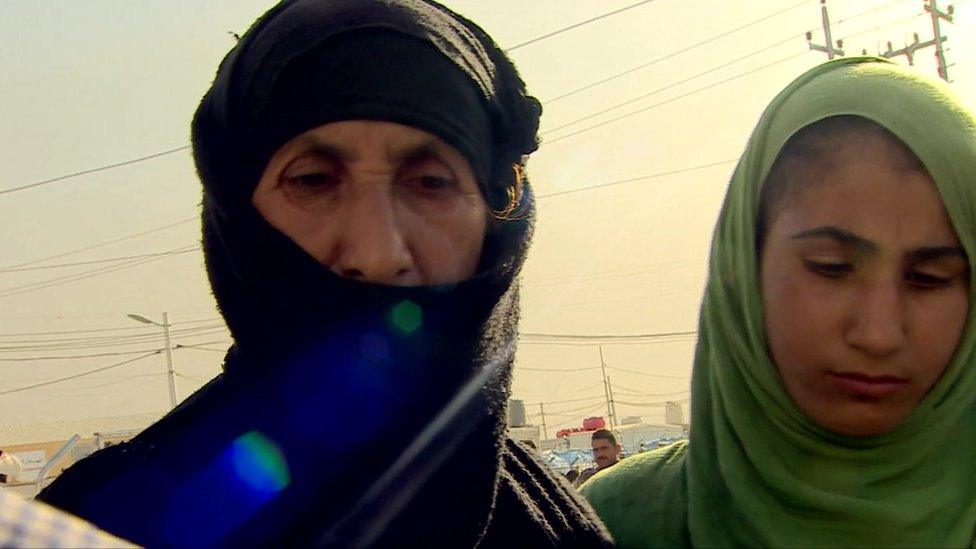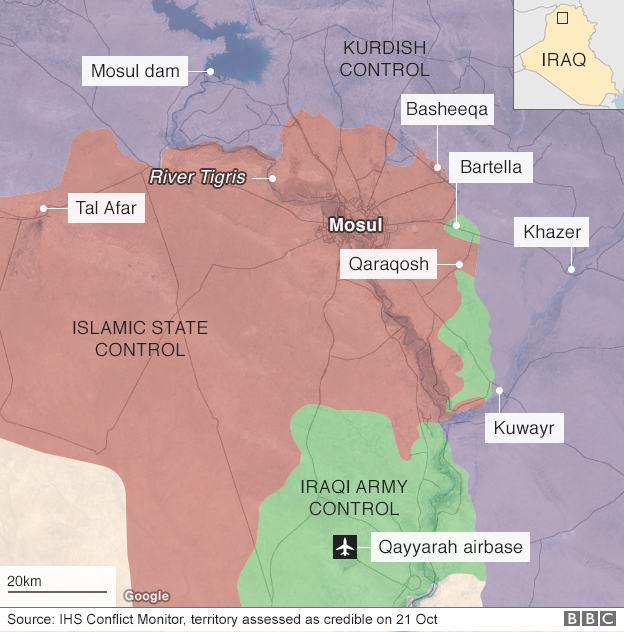Mosul offensive: Iraqis arriving at camp bring tales of peril
- Published
Mosul battle: Inside camp for people fleeing IS fighting
The Dibaga camp, an hour's drive south of Irbil, is home to nearly 30,000 people who have been displaced by so-called Islamic State fighting in northern Iraq.
Since the Mosul offensive started, hundreds of families from areas around the city have managed to flee. The UN refugee agency (UNHCR) says the camp has been receiving around 50 people daily, on average, with that number likely to rise.
The entrance of one of the main gates of Dibaga looks like an open market; people selling vegetables and fruit and a small bakery for fresh Iraqi bread.
A little further into the camp, is the aid distribution centre. Long, spiralling queues of men and women - some carrying their infants - have formed as people wait for hours to get aid.
"Newcomers," I'm told by one of the men lining up to collect mattresses, pillows and blankets for the tents that are now these people's homes.
The blankets will be crucial for the coming winter months.

People needing supplies face a long wait
Everyone is on edge. The aid is there but distribution is unorganised and it is not getting to people fast enough. The camp feels crammed.
One of the residents, Assad Hassan, tells me he fled his village near the city of Nimrud, south of Mosul, a day before the Iraqi government-led offensive against IS started.
He says he was too frightened to stay to see what the so-called Islamic State fighters might do when the Iraqi forces came in. Instead he decided to make the dangerous journey out of the city.
"It was a risk I had to take," he says.
"The road out of my village was mined. There were two cars ahead of ours and they were both blown up. I was extremely scared. I felt that I could be killed at any moment.
"I left with the women and children," he adds. "My sons left the next day. They had to swim across a river under heavy gunfire."

Iraqi and Kurdish forces territory gains in and around the city of Mosul
Asked where he sleeps now, he points to the carpet we're sitting on in the courtyard of the mosque in the camp.
The UN says about 5,000 people have been displaced so far by the fighting around Mosul and are in need of humanitarian assistance.
That is a fraction of the estimated one million people the UN is expecting to flee Mosul itself once the battle starts there.
It is a humanitarian crisis Iraq is not ready for, aid agencies have warned.
"Dibaga is already very crowded and we need to expand," Bruno Geddo, UNHCR chief for Iraq, says.
"We have the tents. We now need the land to put them on and provide people with the basics - a roof over their heads."

Read more on the battle for Mosul

Dibaga is surrounded by plains, but Mr Geddo says the process of acquiring land to expand the camp had been extremely slow.
In a separate area of the camp, there's an unusual sound of celebration. People from Sabaweya village have just heard that it's been cleared of IS fighters and have broken into traditional song and dance, with one woman throwing sweets at the crowd.
Despite the good news, it'll be a while before any of these displaced people are able to go back to their hometowns.
Mosul battle: Young girl says IS militants 'took her father'
IS fighters have been putting up fierce resistance, using different tactics to slow down, and on occasions, stop the Iraqi forces' advance towards Mosul.
"They killed men from the army in our village," 10-year-old Zaman says.
She comes from a village near Mosul, and has been in the camp for three months with her mother and sister.
"I saw them kill a man. I was very scared," she says.
"My dad is with the army and they threatened to kill him too. They said: 'You either join us or we'll kill you or take you to prison'.
"They took him. It's been three months now and I haven't seen him - my baby sister was born and he hasn't seen her."
The Christian families in exile in Iraq
In another camp in Irbil's mainly Christian Ankawa area, a makeshift bell tower with a cross on the top has been placed at the entrance.
Most of the residents there are from the town of Qaraqosh, which was recently stormed by the Iraqi forces.
It is the country's biggest Christian town and when IS attacked in 2014, all of its 50,000 residents fled.
Fadya Yousef says she and her family have been glued to the TV since the Mosul offensive started.
"We were very happy when we heard that the [Iraqi] fighters went into our town," she says.
"I just want to go back to my hometown... Even if I live in a tent there, I'll be happy."
Qaraqosh has been contested for days, but the latest reports suggest that the Iraqi forces are in control at the moment.
Fadiya's son, Youssef, is fighting on the front line with the Kurdish Peshmerga forces.
"Of course, I think about him," she says.
"But there are so many mothers like me with one or even two sons on the front line. I pray for their safety."